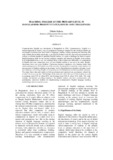Teaching English at the primary level in Bangladesh : present status, issues and challenges
Citation
Sultana, D. (2010). Teaching English at the primary level in Bangladesh : present status, issues and challenges . BRAC University Journal, Special Issue(01), 102–109.Abstract
Communicative English was introduced in Bangladesh in 1996. Communicative English is a modern approach in which a way of spontaneous learning is implied. In this method students are encouraged to practice four basic skills of language: reading, writing, speaking and listening. But with students having little opportunity to use English in their social and classroom environment and without a sufficient number of qualified English teachers, it is quite a challenge for them to acquire English language skills. In the existing situation, teaching and learning of English at the primary level in Bangladesh has a very low standard. Most of the students face difficulties to communicate in English and even competency level of most English teachers is not up to the mark. Besides, classrooms have very poor facilities. Classroom practices emphasize rote learning rather than understanding and use of English in real life situations. Keeping this in mind this study explores the present status of English teaching at the primary level in Bangladesh and identifies the major issues and challenges of teaching English at the primary level in Bangladesh and their probable solutions. The study shows that each teacher in both government and registered non-government schools has to take 7-8 classes everyday. The findings of the study also show that most of the students are weak in speaking (rural 52% & urban 60%) and listening (rural 26% & urban 24%) skills. The study strongly recommends providing training to the English teachers and more communicative and participatory classroom facilities for implementing communicative English language teaching methodology and assessment system.

